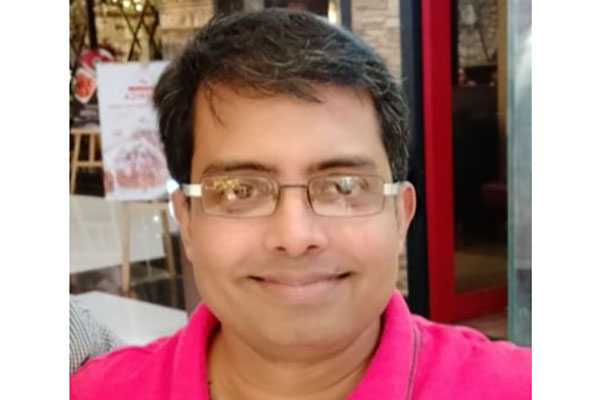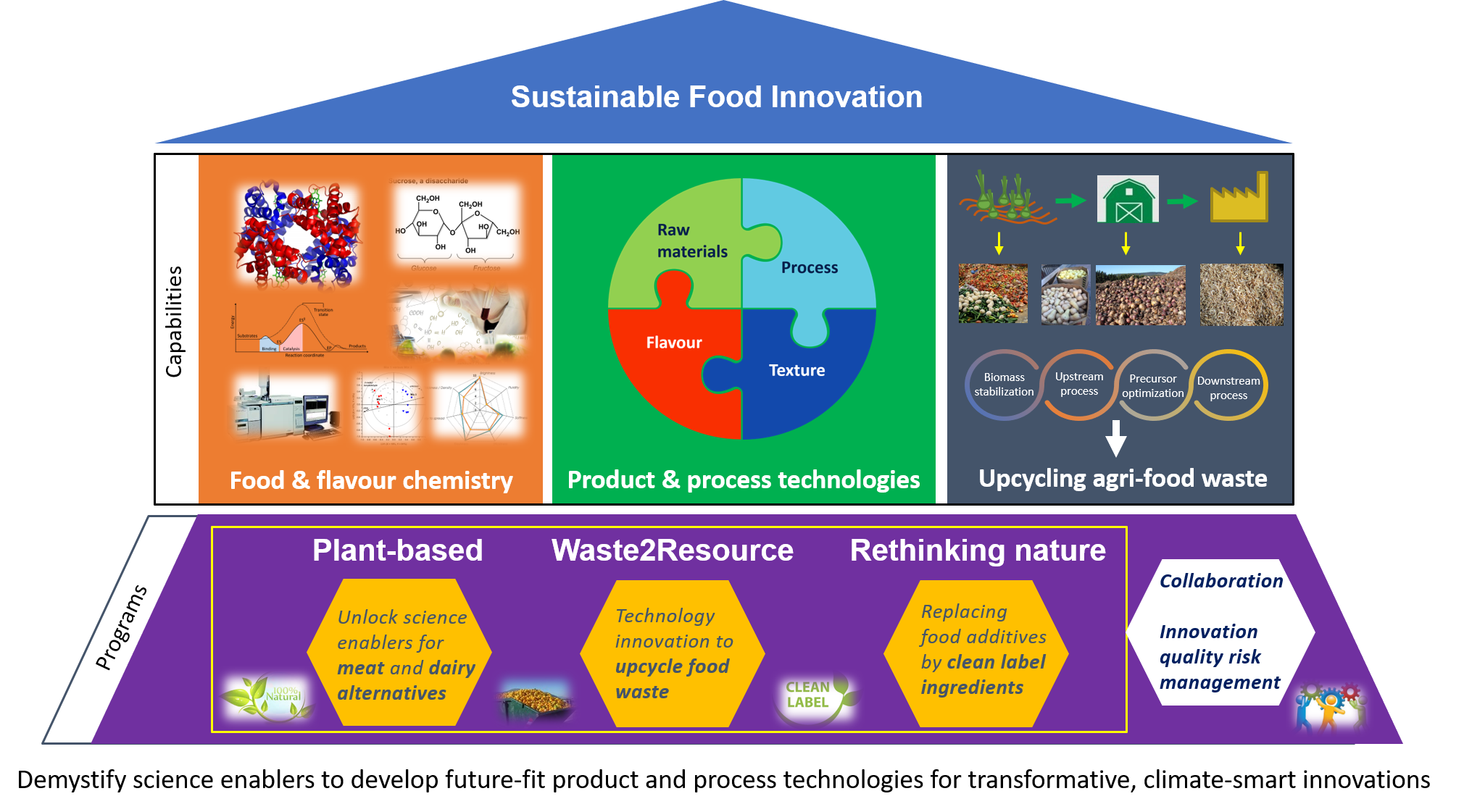Dr Parag Acharya

Dr. Parag Acharya joined NRI in 2020 brining 14 years of industrial R&D experience in food and biotechnology sectors with a successful track record of science and technology led product innovation. Since joining NRI as part of Food and Nutrition Sustainability Initiative (FaNSI), he has contributed (as PI/Co-I) to six research grants during 2021-2022 which worth total ~£1.5m of external funding (see below) to enable new insights on the alternative protein and resilient food supply chain. Besides, leading Food Processing and Innovation research group within the FMD, Parag is also the innovation growth manager for Growing Kent and Medway (GKM) cluster (http://www.growingkentandmedway.com) funded by £17.8million UKRI Strength in Places grant.
Jointly with the UKRI, GKM team has recently (Q1 2020) delivered a multi-stakeholder workshop to assess the UK landscape for alternative protein where Parag acted as the facilitator to identify the UK relevant priorities and knowledge gaps. He is also leading the development of Medway Food Innovation Centre (MFIC) which will not only create a vibrant ecosystem in the region but also deliver next generation technologies for the alternative protein based food.
Before joining NRI, Parag had been working for Unilever Food R&D (2011-2020) and delivered patented products and sustainable process technologies for brands like Knorr, Hellmann’s etc. (lead inventor of 4 patents: WO 2020099180, WO 2017140439 A1, WO 2017001154 A1 and WO 2013189709 A1). He had a proven track record of successfully leading strategic open innovation partnerships and championed several academia-industry collaborations funded by EU FP-7 ITN, TKI-Agri Food, BBSRC-CTPs etc.
Parag’s pioneering work as Unilever science lead demonstrated the impact of the food processing on the flavour composition of plant-based food products via understanding process-microstructure-function inter-relationship. His research at the Unilever also provided scientific insights on the causative chemistry of culinary flavour generation by unravelling how aroma generation can be controlled by the optimal processing of vegetables including utilization of the agri-food by-products.
Parag is highly skilled in building multi-disciplinary collaborations and leading co-creative food innovation. He also worked with the innovation quality management team in Unilever and has extensive network within the food companies.
Parag has initiated contacts with some of the renowned agri-food accelerators across the globe (e.g. StartLife in Wageningen, GROW in Singapore, and Swiss Food Valley etc.) to leverage their experiences in setting up the plant based food accelerator programme in the Medway campus which will support food enterprises of this region to grow faster.
His interest lies in demystifying science enablers to develop future-fit product and process technologies for alternative protein-based food innovation. His research priorities are alternative protein and clean label product technologies by connecting domains of upcycled ingredient technologies, sustainable processing, and novel product formulation. When designing food, it is ubiquitous to understand the molecular properties of ingredients and how they interact with the matrices during processing to impart various functional attributes. Parag’s research work therefore aims to understand how novel processing affects physicochemical properties of alternative plant/algae/fungal protein to deliver the desired functionalities of meat alternatives and dairy free products. To feed ~10 billion people by 2050 with food that does good to people as well as nature, a total re-invention is needed on how raw materials being sourced, food products are designed and processed which necessitates key scientific unlock to create a circular food value chain via food system thinking. Parag’s research should enable more efficient and resilient food production with better understanding of drivers for sustainable manufacturing and consumer acceptability.
His motivation to return to academia and join reputed NRI, Faculty of Science and Engineering, University of Greenwich has been to leverage the understanding of industrial knowledge gaps to deliver Protein4NetZero research and innovation programme which will help the UK to accelerate its shift to a more sustainable food system. Consumer habits are changing with rising vegan and flexitarians choices, growing demands for clean label (free from additives) and authentic food products. Such scenarios entail a transformative opportunity to re-think the fundamentals of food technologies and deliver a disruptive food innovation with more industry-academia partnerships. Thus, Parag’s ambition is to integrate Medway Food Innovation Centre with the enterprise vision of the University of Greenwich by strengthening the connection between science and application via the knowledge exchange framework.
Parag is leading the ‘company connect’ programme within the GKM to engage food industries to the Medway campus and promote collaborative R&D. He is acting as Innovation Lead for the UKCRF Kent & Medway Food Partnership project and part of Algae-UK organizing committee for developing the Roadmap for Algae in the UK diets.
Project: Climate smart food innovation using plant & seaweed proteins from upcycled sources (IPSUS); 2022 – 2025 (PI)
Description: A trans-national consortium (consists of 7 universities and 2 industrial partners across 6 countries from 3 continents) will deliver transformative food innovation by linking sustainable protein shift and food waste valorisation which will innovate upcycled plant protein-based meat and dairy alternatives thereby addressing Net Zero challenges.
Funding: 2021 joint call of FOSC and SUSFOOD2
Project: Identifying opportunities for sustainable productivity growth across the agri-food chain; 2021 – 2023 (Co-I)
Description: Perform LCA based modelling of key food commodities for evaluating the most significant drivers of impact towards GHG emissions etc. and to highlight feasible pathways which can minimise the UK food system’s impact on nature. (Led by Dr Conor Walsh; in collaboration with Rothamsted Research and University of Surrey).
Funding: DEFRA (consultancy project)
Project: From nutrition to flavour - novel food and food ingredients from microalgae; 2022 (Co-I)
Description: Proof-of-concept studies to assess the effect of different food processing methods on the nutritional and taste markers in microalgae, and to achieve the most suitable food product with the right processing condition (Led by Dr Sui Yixing; in collaboration with Open University and Minerva).
Funding: STFC Food Network+
Project: Identify high yield protein extraction from seaweed via understanding structure-function relationship of cell wall; 2021-2022 (PI)
Description: Assess proof-of-concept/technical feasibility of novel protein extraction methods for red and green seaweeds and 3D structure analysis of cell walls using high resolution scattering techniques (in collaboration with ISIS Neutron & Muon Sources, University of Lincoln and Born Maverick Ltd.).
Funding: STFC Food Network+
Project: Assess value chain opportunity for plant-based protein by upcycling agri-food by-products & improving food safety; 2020 – 2021 (UK PI)
Description: Create a multi-disciplinary network platform to scout research and innovation opportunities about plant proteins from renewable sources (in collaboration with HUST, Vietnam and partners).
Funding: GCRF Network grant
Project: Identification of umami taste markers from microalgae; 2020 – 201 (Co-I)
Description: Assess ‘umami’ rich microalgal biomass via GC-MS based quantitative screening of ‘umami’ flavour markers.
Funding: STFC Food Network+
Project: Reprocessing Under-utilized Onion Waste (REUNION); 2018 – 2023 (Co-I/Unilever science lead)
Description: Develop science and technology for valorisation of onion side-streams from post-harvest value chain (led by University of Reading).
Funding: BBSRC-CTPs
PhD co-supervision: 1
Project: Natural vegetable-based ingredients from vegetable waste (Waste2Taste); 2017 – 2021 (Co-I/Unilever science lead).
Description: Design an innovative processing strategy to convert vegetable waste into high value, natural food ingredients, in the form of dried products with extended shelf life (led by Wageningen University).
Funding: TKI-Agri Food (Netherlands)
PhD co-supervision: 2
Project: Thin film drying; 2015-2019 (Co-I/Unilever science lead).
Description: Develop knowledge-based guidance for mild drying of selected foods via systematic comparison of various thin film drying technologies for tomato and milk (led by Wageningen University)
Funding: NWO (Netherlands Science Foundation).
PhD co-supervision: 1
Project: Science based precision processing for future healthy, structured, and tasteful fruit and vegetable-based foods: an integrated research and training program (HST Food Train); 2012-2016 (Co-I/Unilever science lead).
Description: To train multi-disciplinary experts with multisectoral experience and insight in the impact of food processing on the composition and (micro)structure of fruit and vegetable based food products and the relation between the latter properties and product quality parameters, such as texture/rheology, flavour and nutrient bio-accessibility. This is the consortium made of nine academic and industry partners (led by KU Leuven, Belgium).
Funding: EU-FP7 Marie Curie ITN
PhD co-supervision: 1
Master student supervision: 1
- Sui, Y.; Mazzucchi, L.; Acharya, P.; Xu, Y.; Morgan, G.; Harvey, P.J. A Comparison of b- Carotene, Phytoene and Amino Acids Production in Dunaliella salina DF 15 (CCAP 19/41) and Dunaliella salina CCAP 19/30 Using Different Light Wavelengths. Foods 2021, 10, 2824
- Pegiou, I., Mumm, R., Acharya, P., de Vos, C. H., & Hall, R. D. (2020). Green and White Asparagus (Asparagus officinalis): A Source of Developmental, Chemical and Urinary Intrigue. Metabolites, 10(1), [17]. https://doi.org/10.3390/metabo10010017
- Qiu, J., Acharya, P., Jacobs, D. M., Boom, R. M., & Schutyser, M. A. I. (2019). A systematic analysis on tomato powder quality prepared by four conductive drying technologies. Innovative Food Science and Emerging Technologies, 54, p. 103-112. https://doi.org/10.1016/j.ifset.2019.03.013
- Koutidou, M., Grauwet, T., Van Loey, A., Acharya, P. (2017). Impact of processing on odour-active compounds of a mixed tomato-onion puree. Food Chemistry, 228, 14-25. https://doi.org/10.1016/j.foodchem.2017.01.135
- Koutidou, M., Grauwet, T., Van Loey, A., Acharya, P. (2017). Potential of different mechanical and thermal treatments to control off-flavour generation in broccoli puree. Food Chemistry, 217, 531-541. https://doi.org/10.1016/j.foodchem.2016.09.003
- Koutidou, M., Grauwet, T., Acharya, P. (2016). Effect of different combined mechanical and thermal treatments on the volatile fingerprint of a mixed tomato–carrot system. Journal of Food Engineering, 168,137-147. https://doi.org/10.1016/j.jfoodeng.2015.07.028
- Innovation Growth Manager for Growing Kent & Medway innovation cluster
- FMD research group lead for Food Processing and Innovation
- Leading development of Medway Food Innovation Centre
Professional activities:
- Member, Royal Society of Chemistry (MRSC)
- Member, American Chemical Society
- Member, European Federation of Food Science & Technology
- Member, Algae-UK
- Industry Advisory Panel member of Biochemical Society (UK)
- Reviewer: J. Food Engineering, Food Chemistry, J. Food Quality
- (Former) Scientific committee member of “Total Food 2017”
Prizes/Awards:
- 2019: Unilever Global Product Network award
- 2019: Unilever Food Science and Technology Recognition award
- 2007: Alberta Ingenuity R&D Associateship, Canada
- 2004: IUPAC Prize for Young Chemists for best PhD thesis in chemical sciences
- 2003: IUPAC Travel award for Young Scientists
ORCID
https://orcid.org/0000-0003-2521-9968
ResearcherID (WoS)
AAV-7103-2020
Research Gate
https://www.researchgate.net/profile/Parag_Acharya2


